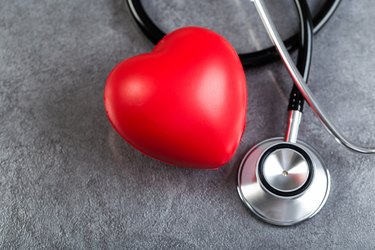
If you have cancer, should you worry if your heart rate seems faster than usual? In most cases, probably not, health experts say. But there are situations where you might want to seek medical attention. Here's how to tell when to be concerned.
Read more: What's Causing Your Elevated Heart Rate?
Video of the Day
Video of the Day
Cancer and Heart Rate
First, what's considered a fast heart rate depends on factors such as your age and physical condition, according to the American Heart Association (AHA). In general, though, the AHA says your resting heart rate — when you're sitting calmly and you're not ill — should normally be between 60 and 100 beats per minute.
If you have cancer (or have survived cancer) and your resting heart rate goes above the normal range (called tachycardia), what might be the cause?
"The most common reason why someone would have an elevated heart rate isn't necessarily related to cancer or its treatment," says Saro Armenian, DO, MPH, a hematologist-oncologist at the City of Hope Comprehensive Cancer Center in Duarte, California, and a co-author of the American Society for Clinical Oncology's guidelines, "Prevention and Monitoring of Cardiac Dysfunction in Survivors of Adult Cancers."
In most cases, he says, it's the everyday things. "Fever can cause an elevated heart rate, dehydration can cause an elevated heart rate, thyroid disorders can cause an elevated heart rate," Dr. Armenian says.
"And then certain medications can do it as well, including some illicit substances, like cocaine, or other recreational drugs." In these cases, he says, once the cause is resolved — for example, your fever goes down or you rehydrate by drinking fluids — your heart rate likely will return to normal.
There are two important things to note, however, says Dr. Armenian. One is how long the elevated heart rate lasts. "If the elevated heart rate is persistent — without any symptoms, but it's persistent for hours and even days — then I think it's worthwhile contacting your primary care provider for additional testing workups," he says.
The other factor is whether you have additional symptoms. "If the symptoms are concerning for heart issues — and that would be shortness of breath, chest pain, dizziness, fainting-type episodes — those I would take a little bit more seriously than just an isolated elevated heart rate," says Dr. Armenian. These can all be symptoms of a heart attack, according to the U.S. National Library of Medicine, which recommends calling 911 (or your local emergency number) if you experience them.
Chemo and High Heart Rate
The question here is whether cancer treatments such as chemotherapy can cause a racing pulse. "There aren't too many that can directly cause an elevated heart rate," says Dr. Armenian. "But there are some cancer treatments that, if they do enough damage to the heart, where the heart is not functioning well enough, can manifest in an elevated heart rate."
According to American Society of Clinical Oncology guidelines, you may be at higher risk for developing heart problems after cancer treatment if you received chemotherapy that included medications called anthracyclines or a drug called trastuzumab, or if you had radiation treatment that could have affected your heart.
Whether you have increased risk depends on a number of factors, including:
- The dosage you received.
- How many of these types of treatments you had
- Whether you have other cardiovascular risk factors such as age, smoking, high blood pressure, diabetes or high cholesterol.
Dr. Armenian urges people to stay informed about any long-term risks. "I think it's important that cancer survivors understand what treatments they received as part of their cancer treatment, and they should know, or have information from their provider, about whether or not any of the cancer treatments that they received have potential impact on the heart itself later on — not just during treatment, but in the years after," he says.
If you are at increased risk, Dr. Armenian says, get screened regularly for potential heart problems and seek care right away if you have heart-related symptoms, whether or not those symptoms include a fast heart rate.
- Saro Armenian, DO, MPH, hematologist-oncologist, City of Hope Comprehensive Cancer Center, Duarte, California
- American Heart Association: “Tachycardia: Fast Heart Rate”
- U.S. National Library of Medicine: “Warning Signs and Symptoms of Heart Disease”
- American Society of Clinical Oncology: “Prevention and Monitoring of Cardiac Dysfunction in Survivors of Adult Cancers: American Society of Clinical Oncology Clinical Practice Guidelines”
- American Heart Association: “All About Heart Rate (Pulse)”